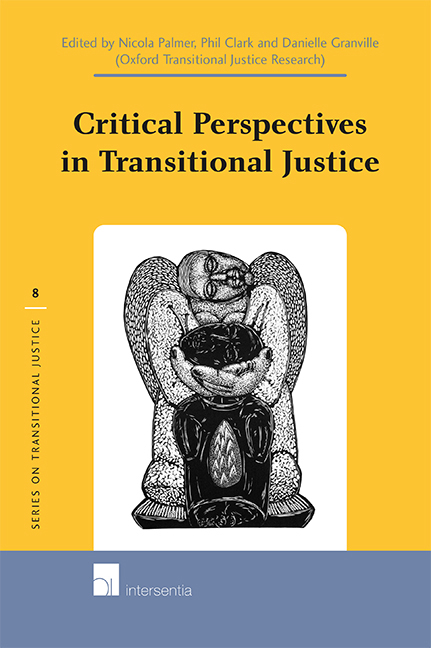
-
Select format
-
- Publisher:
- Intersentia
- Publication date:
- December 2020
- February 2012
- ISBN:
- 9781839700224
- 9781780680354
- Dimensions:
- Weight & Pages:
- Dimensions:
- Weight & Pages:
- Series:
- Series on Transitional Justice
- Subjects:
- Law, Humanitarian Law
You may already have access via personal or institutional login- Series:
- Series on Transitional Justice
- Subjects:
- Law, Humanitarian Law
Book description
In the last twenty years, the field of transitional justice has gone from being a peripheral concern to an ubiquitous feature of societies recovering from mass conflict or repressive rule. In both policy and scholarly realms, transitional justice has proliferated rapidly, with ever-increasing variety in terms of practical processes and analytical approaches. The sprawl of transitional justice, however, has not always produced concepts and practices that are theoretically sound and grounded in the empirical realities of the societies in question. Critical Perspectives in Transitional Justice takes stock of this burgeoning field and, in gathering the views of scholars and practitioners from a wide range of national and methodological backgrounds, explores four key concerns with current trends in transitional justice: the under-theorisation of the field, its disconnect from core academic disciplines, its tendency towards advocacy rather than analysis, and its emphasis on technical institutional responses without clear articulations of their objectives. This vital book - edited by Oxford Transitional Justice Research - is designed to deepen theoretical and empirical discussions within transitional justice by providing critical perspectives on common concepts, issues, methodologies, institutions and mechanisms. Its purpose is to clarify key terms, challenge core assumptions and highlight important tensions, inconsistencies and disagreements in the field with the ultimate aim of harnessing the enormous energy of transitional justice for more fruitful ends. The breadth of debates in this volume highlights the scope, inclusiveness and ambition of this field but also underscores that - despite its geographical, conceptual and disciplinary expanse - consistent questions arise regarding contextually appropriate objectives, the balance between individual and collective needs and interests, and securing the legitimacy of transitional processes among those affected by past violations.
Contents
Metrics
Full text views
Full text views help Loading metrics...
Loading metrics...
* Views captured on Cambridge Core between #date#. This data will be updated every 24 hours.
Usage data cannot currently be displayed.
Accessibility standard: Unknown
Why this information is here
This section outlines the accessibility features of this content - including support for screen readers, full keyboard navigation and high-contrast display options. This may not be relevant for you.
Accessibility Information
Accessibility compliance for the PDF of this book is currently unknown and may be updated in the future.


